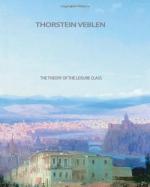
|
| Name: _________________________ | Period: ___________________ |
This test consists of 15 multiple choice questions and 5 short answer questions.
Multiple Choice Questions
1. What influence does Veblen say affects the anthropomorphic cult's later development?
(a) Bureaucratization.
(b) Industry.
(c) Charity.
(d) Efficiency.
2. To what does Veblen compare the martial spirit in lower-class delinquents?
(a) Drunkenness.
(b) The college spirit in sports.
(c) The state of war.
(d) Youthful impetuosity.
3. Under what conditions does Veblen say that members of the industrial class will fight?
(a) When they are angry or drunk.
(b) He says they will fight for almost any reason.
(c) When they want to settle a score.
(d) When someone's honor has been insulted.
4. What does Veblen say is the reason for gambling?
(a) Distrust in the economic system.
(b) A belief in luck.
(c) Longing for riches.
(d) Failure to be convinced of the value of labor.
5. Which class does Veblen say exhibits peaceful traits?
(a) The leisure class.
(b) The industrial class.
(c) The middle class.
(d) The ownership class.
6. How does Veblen describe the industrial classes' relationship with sports?
(a) As an occasional diversion.
(b) As an addiction.
(c) As a passion.
(d) As a form of warfare.
7. What factor besides luck affects gambling on sports, according to Veblen?
(a) The prestige of the contestants.
(b) The omens that surround the game, such as the weather.
(c) The ability to turn loss into a gambling victory.
(d) Pride in the strength of the winners.
8. What does Veblen say is the purpose of devout observances?
(a) To capture some of the spoils of exploitation in the church.
(b) To motivate the community to greater efficiency.
(c) To lower the economic efficiency of a community.
(d) To give time for reflection, reconsideration, and invention.
9. What does Veblen say fighting does for lower-class delinquents?
(a) Veblen says that it threatens the upper classes.
(b) Veblen says that it culls the weak.
(c) Veblen says that it settles property disputes.
(d) Veblen says that it asserts manhood.
10. In what activity do delinquents rival the leisure class?
(a) Consumption.
(b) Fighting.
(c) Production.
(d) Unproductive leisure.
11. To what does Veblen say that education is similar?
(a) Devotional practice.
(b) Marriage.
(c) Warfare.
(d) Mercantilism.
12. How does Veblen describe sports?
(a) As vicarious leisure.
(b) As nonproductive labor.
(c) As dishonorable waste.
(d) As decorous recreation.
13. How does Veblen say contestants in sporting events demonstrate their belief in luck?
(a) By offering sacrifices.
(b) By saying prayers to fortune.
(c) By wearing talismans.
(d) By performing rituals.
14. What does Veblen see as evidence of the martial spirit in the leisure class?
(a) Lawsuits.
(b) Dueling.
(c) Monopolies.
(d) Competitive business practices.
15. What is affected by the institution of a social class?
(a) The character of individuals.
(b) The means of production.
(c) The character of the social structure.
(d) The economic model for society.
Short Answer Questions
1. What form does Veblen say the pressure to change takes?
2. Under what conditions is there a quasi-peaceful stage in Western culture, according to Veblen?
3. Which class has the most martial spirit, according to Veblen?
4. What does Veblen say that the leisure-class and lower-class delinquents have in common, along with their belief in an unseen hand?
5. According to Veblen, what are sports based on?
|
This section contains 555 words (approx. 2 pages at 300 words per page) |

|




